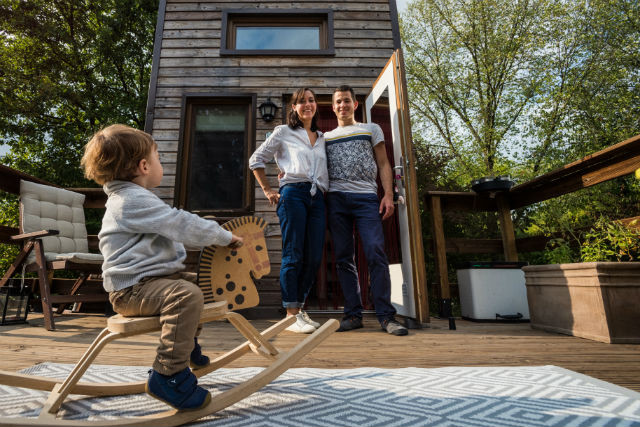When Emmy McNiece welcomes me into her two-storey, 25sqm house on a campsite near the capital, I’m struck by how spacious it feels. The northern mother, who hails from Belfast, her French partner Quentin Richard and their baby, have been calling the "The Lil Nest on Wheels" home since June 2017 when they left a 45 sqm flat in France.
But the idea came about long before that. “It was Quentin really. Like most people we were in a normal flat when we started thinking about the future. We were in France, working in Luxembourg, getting stuck in traffic every day,” McNiece recalls. The pair looked at properties in Luxembourg but eyewatering prices forced them to consider alternatives. “We didn’t want to take a loan for 30 years for a house that’s so big but still doesn’t have everything we want.”
They wanted to be able to live more sustainably, in a home constructed of ecologically sound materials, with big open spaces, surrounded by nature not far from their work in Luxembourg. Having seen the emergence of the tiny house movement in north America and France, some of which can house families of five, they set about building their own with the help of friends and family. Costing around €30,000, equivalent to what the couple recently paid for their car, the tiny house includes an open living, dining and kitchen area, a bathroom with shower and a second floor with space for two beds and clothing storage. Cleaning the house is a doddle, taking just 30 minutes from top to bottom and, if things start to feel too crowded, they just step outside.
Minimalist living
“We thought we were minimalist until we moved here,” McNiece said, adding: “It’s helped me to not go over-the-top, especially with our son. If he has too many toys, he can’t focus,” McNiece explains. She adds that the move meant she was able to take more time off work to raise her son, without hitting them too hard in the wallet. And, because the house is currently pitched in a campsite near Luxembourg City, Richard is able to cycle to work every day, keeping him fit and avoiding the traffic jams.
But it has not been without its challenges—namely finding a place to pitch up. Initially, the couple wanted to create a tiny house eco-village. But, since theirs is the first tiny house in Luxembourg, it will be some years before a community emerges. Then there is the question of finding land. With land prices at a premium in the south, the couple has moved several times. They are renting a pitch at a campsite until it closes at the end of October, after which, the couple are not sure where they will move to.
McNiece is hoping that a landowner with a big garden or farmer will give them a more permanent plot, in exchange for which the couple is prepared to do odd jobs, or babysit, for example, or pay rent. McNiece’s dream is to live autonomously, growing vegetables and keeping chickens. The couple plan to stay with their tiny house for the next five years, at least. “After that, it’s hard to say,” Richard says. “It could also stay as a second house or a house we rent for income or we could sell it. It wasn’t a massive investment.”
